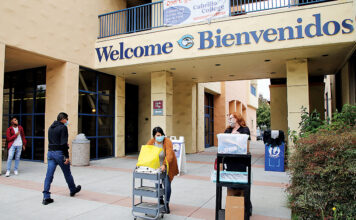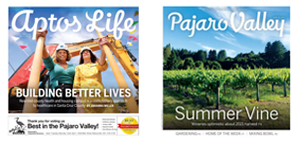For many, the process of 3D printing is still akin to magic. Witnessing a digital design take shape in a physical form through a 3D printer, creating everything from architectural models to human prosthetics, seems like a miracle — until you actually understand the science behind it.
Since Jan. 20, a sizable collection of 3D printers, along with laser and vinyl cutters, routers, soldering stations and more are now available to Cabrillo College students, faculty and the community at the school’s new Makerspace center.
The brainchild of Payson McNett, a former Cabrillo student who came back to the school as an adjunct art instructor a few years ago, Makerspace will be a center for people to utilize various digital fabrication equipment for classwork, projects and personal creations.
“The idea was to build a center for everyone to use,” McNett said. “We want it to be a cross-disciplinary space, such as a library or computer lab, where people from all departments can come and use this equipment for their own specific needs.”
The crew of Makerspace have been giving “sneak peeks” of the center to the public since December. They invited anyone interested to come see what the center is all about.
“Even if it’s just out of pure curiosity, we want people to come check it out,” McNett said. “You never know what you might find.”
Two years ago, McNett opened the Fab Lab, a digital fabrication lab within Cabrillo’s art department. But he knew that the type of equipment shouldn’t only be utilized for art; that other departments on campus as well as non-students should be allowed to have access.
With help from the Cabrillo College Foundation, Visual and Performing Arts Dean John Graulty, Santa Cruz’s Maker Factory, and many others, McNett was able to pitch the idea of the Makerspace. In July, Cabrillo received a two-year Maker Initiative grant from the California Community College Chancellor’s Office to begin developing.
Just within the Fall 2017 semester, the center at the college’s Aptos campus has taken shape.
“It’s been a whirlwind,” McNett said. “But we have a great team. There is an amazing community here at Cabrillo who’ve been supportive since the very beginning.”
Cabrillo students and faculty will be able to use the center for free, but only after taking the Art 95A (Survey of Digital Fabrication) course. Non-students who are interested in a membership to Makerspace can sign up for a weekend workshop through Cabrillo Extension to be trained on the equipment.
Makerspace’s primary goal, according to McNett, is to help students gain skills that will help them find jobs. The Makerspace Internship Program was created to give students a chance to gain experience before joining the workforce. In addition, Makerspace staff can help to identify businesses that could benefit from people with said skills.
“Technology is evolving so fast, so of course, so are jobs,” McNett said.
At the end of the day, McNett credits the community at Cabrillo for Makerspace becoming a reality.
“It took a lot of collaboration and a lot of hard work,” he said. “Any time you do something new like this, it’s a challenge. But it worked out. Cabrillo changed my life a long time ago — I’m glad I’m finally able to give back.”
For information, visit cabrillomakerspace.com or call 477-3392.











